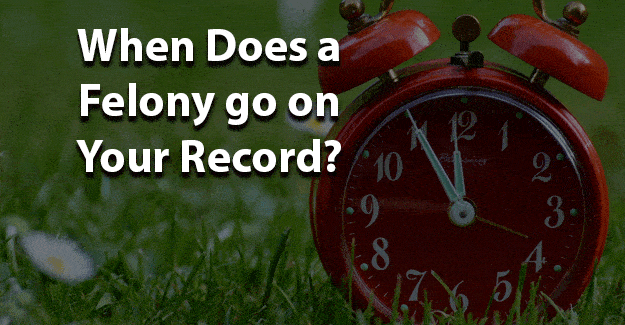Felons typically hear about their criminal record. Questions are often asked about what is in their felony record, when they were charged, and how long their sentence was.
In thinking about each of these aspects of a felony record, at what point does a felony actually go on their record?
This blog post will address the question of when a felony goes on their record.
- Arraignment and Indictment
- The Trial
- Conviction
- Supporting a Felon After Conviction
Contents
Arraignment and Indictment
After being arrested on suspicion of having committed a crime, a person will have his first court date. This is called an arraignment, the court proceeding at which a criminal defendant is formally advised of the charges against him and enters a plea to the charges.
Some states require arraignments in all cases, felony and misdemeanor, in which the accused may face a jail or prison sentence. Other states require an arraignment only in felony cases.
Following arrest, arraignment must occur within a reasonable time according to the Sixth Amendment, which guarantees the defendant the right to a speedy trial. This an appearance of the accused before a judge or magistrate in open court.
In cases in which an arraignment is not set for months, the defendant’s attorney may petition the court to dismiss the charges. The judge will then review the cause of the delay to decide whether the delay was reasonable.
If it is determined to be unreasonable, the charges will be dismissed. Otherwise, an arraignment date will be set, and the legal process will proceed.
A felony indictment is in the form of a document. The indictment is usually read before a judge at a hearing, which is sometimes called an arraignment.
The formal arraignment does not take place, however, until the accused has been arrested and formally charged.
The purpose of a felony indictment is to inform the person of the charges and in order that legal counsel can prepare a defense.
In a way the felony indictment is a form of protection for a suspect. A person is entitled to not be prosecuted until a Grand Jury has determined that there is enough evidence to support criminal prosecution.
This is guaranteed under the Fifth Amendment which states that “No person shall be held to answer for a capital or otherwise infamous crime, unless on presentment of a Grand Jury…”
While in many states a Grand Jury is common in charging a federal crime, others do not use them often.
Those states present the criminal complaint to a lower court judge or magistrate to decide if the prosecutor has presented enough evidence that the accused has committed a crime.
The Trial
Once each of these steps has been completed, the trial will commence. The prosecutor will present the evidence that has been accumulated and call any witnesses.
The defense will examine the evidence and listen to witnesses’ testimony and cross examine them regarding what they have said in their testimony.
After that, closing remarks will be made by both the prosecution and defense attorney.
Then the jury will be asked to weigh the evidence and testimony they have heard in reaching a verdict.
After reaching a decision in the case, the verdict will be read aloud by the judge.
If the defendant is acquitted, the case is closed. However, if the defendant is convicted, they will be held for sentencing.
Conviction
As soon as the verdict is read by the judge, the conviction is entered into the court’s system. Depending on the backlog of the court, the felony will go on the felon’s record immediately.
Usually there is a criminal case manager present in the courtroom to ensure that felony convictions show up on the defendant’s record right away.
Supporting the Accused after Conviction
This is a crucial time for the defendant and his family.
This represents the time when the family can come together to offer their support to their loved one as sentencing and a felony criminal record being established means the beginning of what may be a long prison sentence.
It will be clear at this point how much time they are facing.
It will show the seriousness of the situation on the long road ahead. Encourage them to face their conviction head on and look to serving their time and beginning the road back to redemption. Let them know you are with them throughout the days ahead.
So what do you think about this blog post about when a felony goes on your record? What is your experience with a felony going on your record? Please tell us in the comments below.


